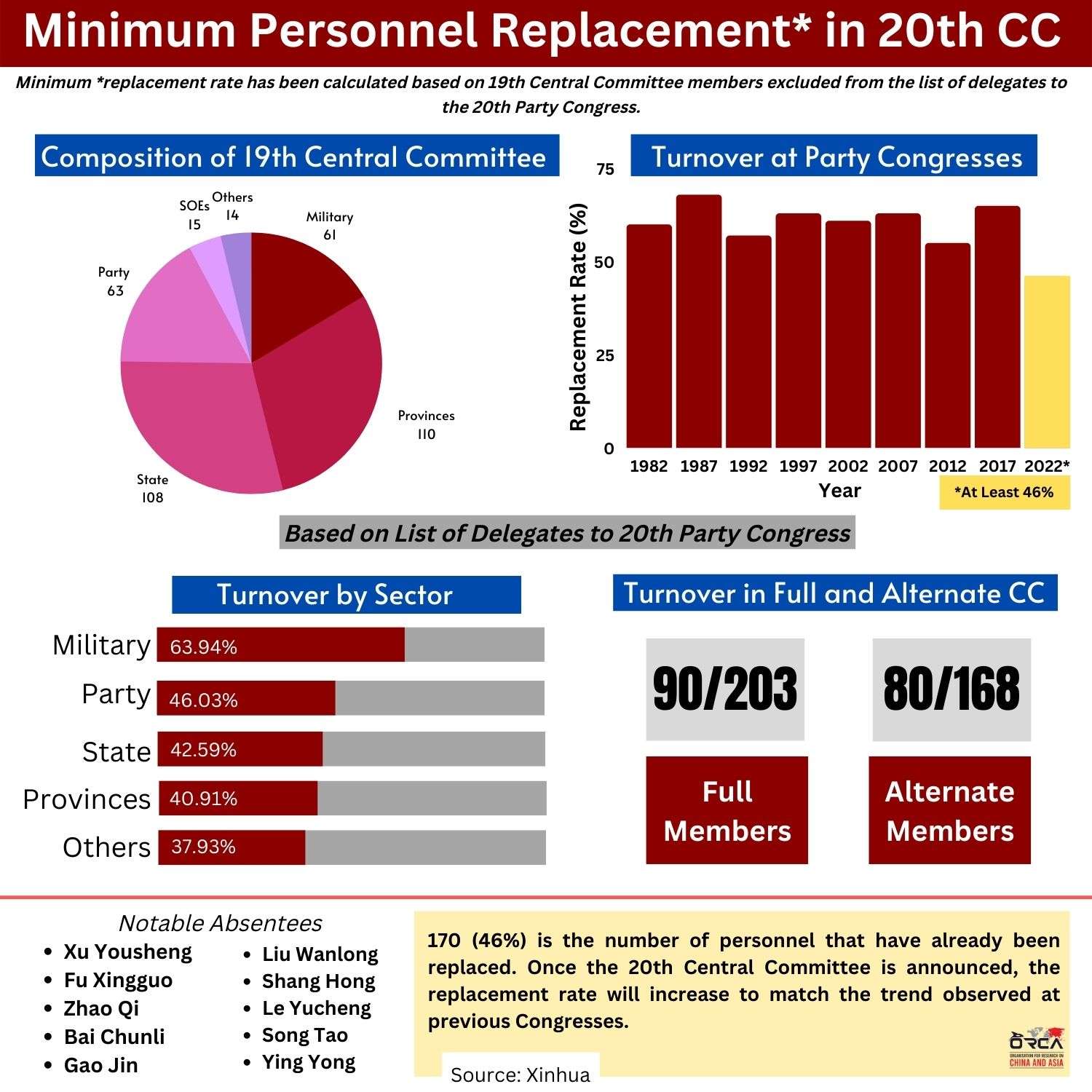The above infographic is a preliminary assessment of leadership turnover in the Central Committee. The list of 2296 delegates to the 20th Party Congress is indicative of the replacement rate, which has been determined by the number of 19th CC members excluded from the list of delegates to the Party Congress. This number gives us an idea of how many members will not be part of the 20th CC and how many more could be excluded from the 20th CC, based on replacement rates of previous Central Committees. So far, 46% of members in the 19th CC are not on the list of delegates to the 20th Party Congress. Analysis of replacement rates for previous congresses (refer to bar graph) suggest that around 60% of current CC members will not find a place in the 20th CC.
The Central Committee includes members from various sectors (refer to pie chart for 19th CC composition). The CC members are drawn from positions in the Party, state, military, provinces, SOEs and so on. The infographic shows the minimum replacement rate by sector in the 20th Central Committee. As per the list of delegates to the 20th National Party Congress, nearly 64% (39) military officials who were in 19th Central Committee, will not be part of the 20th Congress. Similarly, 46% (29) of central-level party officials of 19th Central Committee are already out of race for the 20th Central Committee. Further, 42.59% (46) of officials working in the State Council did not make it to the list of 20th Congress delegates. An almost similar number of provincial officials (45) share the same fate. Other officials include members from SOEs, private companies and GONGOs. The preliminary replacement rate of 46% will increase when the 20th Central Committee is announced on 22nd October. However, these minimum replacement rates serves as an indication for possible changes to be expected in the new Central Committee. For instance, high replacement rates among military officials may suggest reorientation of China’s military strategy.
Out of 203 full members of 19th CC, 90 members did not make it into the delegates list for the 20th Congress. Similarly, 80 out of 168 alternate members are also removed from the race to the 20th CC. Some important officials have been excluded from the 20th Central Committee like Le Yucheng, Song Tao and Ying Yong. Le Yucheng was former Vice Minister of Foreign Affairs and Ambassador to India from 2014-2016. Song Tao was Director of the International Liaison Department from 2015-2022 and was a member of the Central Foreign Affairs Commission until 2022. Ying Yong is currently Deputy Procurator-General of Supreme People’s Procuratorate and was made Party Secretary of Hubei after the COVID-19 outbreak in Wuhan, replacing Jiang Chaoliang.
Possible reasons for their exclusion could be age limit, loyalty or competency. Similarly, some seats in Central Committee might accrue to specific party or state positions and thus, the person holding those positions become ex-officio members of CC.



Prepared by
Omkar Bhole
Omkar Bhole is a Senior Research Associate at the Organisation for Research on China and Asia (ORCA). He has studied Chinese language up to HSK4 and completed Masters in China Studies from Somaiya University, Mumbai. He has previously worked as a Chinese language instructor in Mumbai and Pune. His research interests are India’s neighbourhood policy, China’s foreign policy in South Asia, economic transformation and current dynamics of Chinese economy and its domestic politics. He was previously associated with the Institute of Chinese Studies (ICS) and What China Reads. He has also presented papers at several conferences on China. Omkar is currently working on understanding China’s Digital Yuan initiative and its implications for the South Asian region including India. He can be reached at [email protected] and @bhole_omkar on Twitter.
Rahul Karan Reddy
Rahul Karan Reddy is a Senior Research Associate at Organisation for Research on China and Asia (ORCA). He works on domestic Chinese politics and trade, producing data-driven research in the form of reports, dashboards and digital media. He is the author of ‘Islands on the Rocks’, a monograph about the Senkaku/Diaoyu island dispute between China and Japan. Rahul was previously a research analyst at the Chennai Center for China Studies (C3S). He is the creator of the India-China Trade dashboard and the Chinese Provincial Development Indicators dashboard. His work has been published in The Diplomat, East Asia Forum, ISDP & Tokyo Review, among others. He can be reached via email at [email protected] and @RahulKaranRedd1 on Twitter.